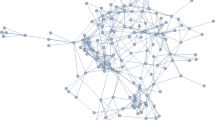Abstract
The focus of this study is on the problem of unequal participation of students within small cooperative learning groups in middle-school classrooms. According to previous research using Status Characteristic Theory, this unequal participation stems from differential expectations for competence based on academic and peer status. Previous research had also found that in classrooms where rank on these two status orders was uncorrelated (incongruent classrooms), problems of unequal participation were less severe. This study involved systematic observations of students in working groups in four middle-school science classrooms. The derivation of hypotheses required an extension of Status Characteristic Theory to handle three-to-five-person groups working in a multicharacteristic situation. The results showed good support for hypotheses explaining the effect of incongruence in the social structure on participation of low-status students. Incongruent classrooms had fewer small groups that were highly differentiated on status. Moreover, the degree of status differentiation in the groups was a direct predictor of the participation rates of the low-status students. Thus, the less differentiated groups in incongruent classrooms showed fewer status problems. As a practical matter, the tendency of students to construct peer status orders that are independent of academic status acts as a natural treatment for unequal participation.
Similar content being viewed by others
References
Berger, Joseph, Cohen, Bernard P., & Zelditch, Morris, Jr. (1966). Status characteristics and expectation states. In J. Berger, M. Zelditch, Jr., & B. Anderson (Eds.), Sociological theories in progress: Vol. 1 (pp. 29–73). Boston: Houghton Mifflin.
Berger, Joseph, Fisek, M. Hamit, Norman, Robert Z., & Zelditch, Morris, Jr. (1977). Status characteristics and social interaction: An expectation-states approach. New York: Elsevier Scientific Publishing Company, Inc.
Bianchini, Julie (1995). How do middle school students learn science in small groups? An analysis of scientific knowledge and process construction. Unpublished doctoral dissertation, Stanford University, Stanford, California.
Borgatti, Stephen P., Everett, Martin G., & Freeman, Linton C. (1996a). UCINET IV Version 1.64 reference manual. Natick, MA: Analytic Technologies.
Borgatti, Stephen P., Everett, Martin G., & Freeman, Linton C. (1996b). UCINET IV Version 1.64 software. Natick, MA: Analytic Technologies.
Borgatti, Stephen P., Everett, Martin G., & Freeman, Linton C. (1996c). UCINET IV Version 1.64 user's guide. Natick, MA: Analytic Technologies.
Cohen, Elizabeth G. (1982). Expectation states and interracial interaction in school settings. Annual Review of Sociology, 8, 209–235.
Cohen, Elizabeth G., & Lotan, Rachel A. (1995). Producing equal-status interaction in the heterogeneous classroom. American Educational Research Journal, 32(1), 99–120.
Cohen, Elizabeth G. & Lotan, Rachel A. (1997a). Operation of status in the middle grades: Recent complications. In J. Szmatka, J. Skvoretz, & J. Berger (Eds.), Status, network and structure: Theory development and theory growth (pp. 222–240). Stanford, CA: Stanford University Press.
Cohen, Elizabeth G. & Lotan, Rachel A. (1997b). Raising expectations for competence: The effectiveness of status interventions. In E. G. Cohen & R. A. Lotan (Eds.), Working for equity in heterogeneous classrooms: Sociological theory in practice (pp. 77–91). New York: Teachers College Press.
Cohen, Elizabeth G., Lotan, Rachel A., & Leechor, Chaub (1989). Can classrooms learn? Sociology of Education, 62, 75–94.
De Leeuw, Jan & Kreft, Ita (1986). Random coefficient models for multilevel analysis. Journal of Educational Statistics, 11, 57–86.
DiPrete, Thomas A. & Forristal, Jerry D. (1994). Multilevel models: Methods and substance. Annual Review of Sociology, 20, 331–357.
Krackhardt, David, Blythe, Jim, & McGrath, Cathleen (with assistance of Mark Herbert) (1995). KrackPlot 3.0, user's manual and software. Pittsburgh, PA.
Lloyd, Paulette (1998). Status problems and social structure in middle school classrooms. Unpublished master's thesis, San Jose State University, San Jose, California.
STATA Corporation (1996). Statistics graphics, data management. Version 5.0, CollegeStation, TX: STATA Corporation.
Webster, Murray, Jr., & Foschi, Martha (1988). Overview of status generalization. In M. Webster, Jr. & M. Foschi (Eds.), Status generalization: New theory and research (pp. 1–23). Stanford: Stanford University Press.
Author information
Authors and Affiliations
Rights and permissions
About this article
Cite this article
Lloyd, P., Cohen, E.G. Peer Status in the Middle School: A Natural Treatment for Unequal Participation. Social Psychology of Education 3, 193–214 (1999). https://doi.org/10.1023/A:1009609126635
Issue Date:
DOI: https://doi.org/10.1023/A:1009609126635




